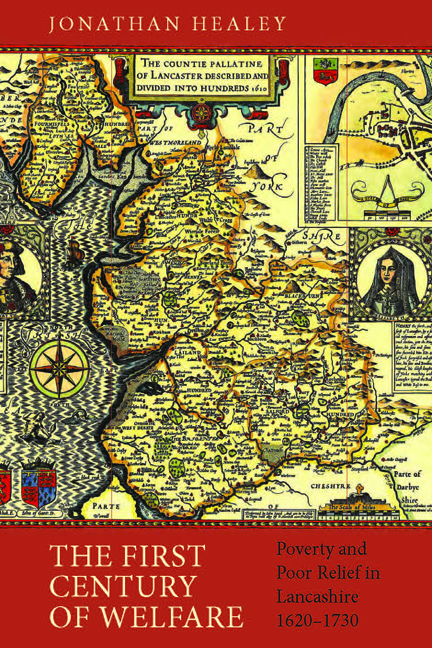Book contents
- Frontmatter
- Dedication
- Contents
- List of Figures
- List of Tables
- Preface
- List of Abbreviations
- Prologue: Becoming Poor
- Introduction: The First Century of Welfare
- PART I CONTEXTS
- 1 Lancashire, 1600–1730: A Developing Society
- 2 The Arrival and Growth of Poor Relief
- 3 Pauper Tales
- PART II MARGINALITY
- PART III MISFORTUNE
- Conclusion: Worldly Crosses
- Bibliography
- Index
1 - Lancashire, 1600–1730: A Developing Society
from PART I - CONTEXTS
Published online by Cambridge University Press: 05 November 2014
- Frontmatter
- Dedication
- Contents
- List of Figures
- List of Tables
- Preface
- List of Abbreviations
- Prologue: Becoming Poor
- Introduction: The First Century of Welfare
- PART I CONTEXTS
- 1 Lancashire, 1600–1730: A Developing Society
- 2 The Arrival and Growth of Poor Relief
- 3 Pauper Tales
- PART II MARGINALITY
- PART III MISFORTUNE
- Conclusion: Worldly Crosses
- Bibliography
- Index
Summary
But a man may judge of the goodnesse of the soile, partly by the constitution and complexion of the inhabitants, who are to see to, passing faire and beautifull, and in part, if you please, by the cattaile. For, in their kine and oxen, which have goodly heads and faire spread hornes, and in body are well proportionate withall, you shall find in maner no one point wanting, that Mago the Carthaginian doth require …
William Camden (trns. Philemon Holland), Britannia (1610)In the summer of 1701, Agnes Braithwaite – a septuagenarian widow from Hawkshead – travelled to Lancaster Quarter Sessions. We do not know whether she went on foot, as would have befitted her poverty, or whether she got a lift, perhaps with a friend or neighbour on horseback. She was, she claimed, ‘a very poore impotent person aged very neare eighty years’, so the latter seems most likely. On the other hand, one of Hawkshead's overseers later complained of how she was not so incapacitated that she could not ‘travel to do mishcheef’, as Justices could themselves see, so perhaps she walked after all.
Of course, no trace has been left to us of Agnes's route south, from the county's northernmost parish to its traditional administrative hub. Most likely she went east first, either crossing Windermere by ferry or passing down its western shore, crossing the Leven at Newby Bridge.
- Type
- Chapter
- Information
- The First Century of WelfarePoverty and Poor Relief in Lancashire, 1620–1730, pp. 29 - 54Publisher: Boydell & BrewerPrint publication year: 2014



